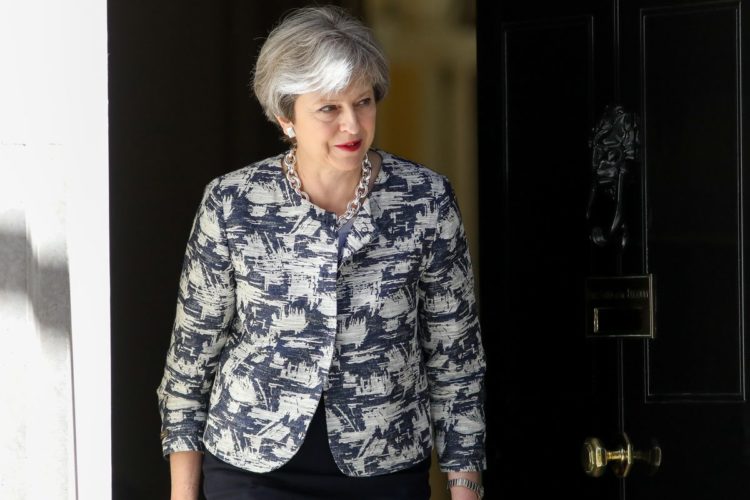U.K. Is Said to Fear Brexit Breakdown Ahead as May, Juncker Meet

published Oct 16, 2017 2:52:19 PM, by Tim Ross
(Bloomberg) —U.K. Prime Minister Theresa May’s government fears Brexit talks will break down unless the European Union gives ground at a key summit this week, according to a person familiar with her team’s views.
Without a clear sign that negotiations will progress to trade and transition arrangements by December at Thursday’s summit of EU leaders, the entire Brexit process will be in danger of collapse — and senior British ministers are losing faith in the EU’s willingness to strike a deal, the person said.
The warning came as the prime minister met European Commission President Jean-Claude Juncker for talks over dinner in Brussels, in an attempt to smooth the path for progress at the summit in the Belgian capital starting Thursday. Afterwards, the pair said they’d had a broad, constructive meeting and agreed to step up attempts to reach a deal on the divorce.
The prime minister and the president of the European Commission reviewed the progress made so far and agreed that these efforts should accelerate over the months to come, they said in a joint statement after the meeting. The working dinner took place in a constructive and friendly atmosphere.
The warm words will do little to calm the nerves of businesses worried that the negotiations are failing to make progress as time runs out. The pound weakened as much as 0.3 percent against the dollar earlier on Monday, on the report of the U.K.’s concerns about the lack of agreement.
What’s Changed
The two sides have until March 2019 to thrash out a deal on their future trading relationship as well as the divorce terms.
Talks have stalled because Britain won’t detail how much it’s ready to pay as it leaves the bloc until the EU starts discussing the future trading deal and the transition that Britain wants to smooth the split. Europe says it won’t do that until May’s government makes sufficient progress on agreeing the exit bill, the rights of EU citizens and the Irish border.
The EU and the U.K. teams originally wanted Thursday’s European Council summit to mark the moment when the talks can move from discussing the separation to plotting a new trade accord.
These hopes have now gone and a new draft of the summit conclusions dealt a further blow to prospects for progress on Monday. The latest text added extra hurdles for the U.K. to clear before negotiations can move on to trade. EU leaders are set to demand a guaranteed role for the European Court of Justice, in a direct challenge to one of May’s red lines.
Political Risk
Speaking on condition of anonymity, the person familiar with the U.K. position said May took a political risk by promising to pay into the EU budget and settle the divorce bill in a speech in Florence, Italy, last month and now needs something in return before she can make further concessions.
The Brexit department rejected suggestions the negotiations are going badly. We are making real and tangible progress – though we hope that the 27 will use the October Council this week to give Michel Barnier the means to make further steps, the department said in an emailed statement. We are taking forward these negotiations in a constructive and responsible way.â€
The latest draft of the summit conclusions included tougher language on the progress that Britain will need to make before the EU agrees to allow talks to progress to trade. That won’t happen until sufficient progress has been made on settling the divorce terms, including the bill, the Irish border, and the status of EU citizens. The new draft states that sufficient progress will need to be achieved on all three areas.
Germany and France had made clear on Friday they wanted to toughen the tone of the summit declaration, according to an official familiar with the discussions.
The Other Side
German Chancellor Angela Merkel and French President Emmanuel Macron are the two key obstacles to allowing talks to move on to trade, according to the first official. Germany has a vested interest in delaying progress in the Brexit talks because Frankfurt is trying to tempt companies away from London, the person said.
May spoke to Macron about Brexit in a call on Monday and Merkel on Sunday. She tried last month to convince the German chancellor that a two-year bridging period after Brexit day would help both sides. So far EU leaders have refused to widen Barnier’s negotiating mandate to include trade or transition, and Merkel has been skeptical about a transition deal. The chancellor is also more preoccupied with forming a new coalition government at home.
Despite the British fears, there was a glimmer of hope from Berlin on Monday. Germany is working on proposals for the EU’s future relations with the U.K. that include calls for the comprehensive free-trade accord that May wants, according to a draft paper prepared by the Foreign Ministry in Berlin.
While it doesn’t constitute the formal position of Merkel’s government, the paper nonetheless offers the U.K. reassurances that Europe’s biggest economy is looking ahead to the prospect of a future deal.
Version:1.0 StartHTML:000000222 EndHTML:000194035 StartFragment:000193175 EndFragment:000193914 StartSelection:000193250 EndSelection:000193902 SourceURL:https://content-service.bloomberg.com/articles/OXXLV66S972DBloomberg Content Service




No Comment